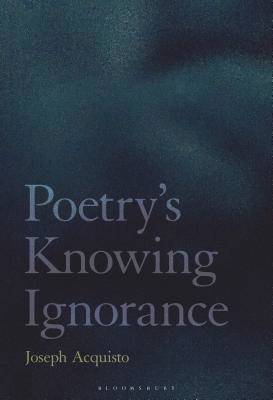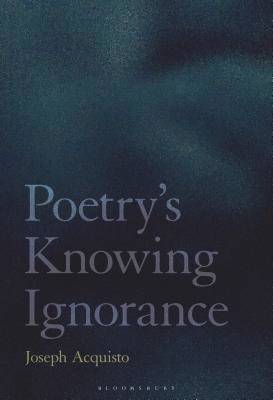
- Afhalen na 1 uur in een winkel met voorraad
- Gratis thuislevering in België vanaf € 30
- Ruim aanbod met 7 miljoen producten
- Afhalen na 1 uur in een winkel met voorraad
- Gratis thuislevering in België vanaf € 30
- Ruim aanbod met 7 miljoen producten
Zoeken
Omschrijving
What kind of knowledge, if any, does poetry provide? Poets make poems, but they also make meaning and craft a kind of learned and creative ignorance as they provide infinitely revisable answers to the question of what poetry is. That question of poetry's definition invites broader ones about the relationship of poetry to other lived experience. Poetry thus implies something like a way of life that is resistant to definitive statements and conclusions, and the creation of communities of readers and writers that live in ever-renewed questioning.
To resist concluding is to embrace a kind of productive ignorance, a knowledge that is first and foremost aware of poetic knowledge's own limits. Poetry's Knowing Ignorance shows, through an examination of French poetry, how it is this dialogue in response to a constant questioning, to an answer-turned-question, that continues to blur the boundary between poetry and writing about poetry, between poetry and criticism, and between poetry and other kinds of experience.Specificaties
Betrokkenen
- Auteur(s):
- Uitgeverij:
Inhoud
- Aantal bladzijden:
- 224
- Taal:
- Engels
Eigenschappen
- Productcode (EAN):
- 9781501355226
- Verschijningsdatum:
- 19/09/2019
- Uitvoering:
- Hardcover
- Formaat:
- Genaaid
- Afmetingen:
- 152 mm x 231 mm
- Gewicht:
- 453 g

Alleen bij Standaard Boekhandel
+ 366 punten op je klantenkaart van Standaard Boekhandel
Beoordelingen
We publiceren alleen reviews die voldoen aan de voorwaarden voor reviews. Bekijk onze voorwaarden voor reviews.







